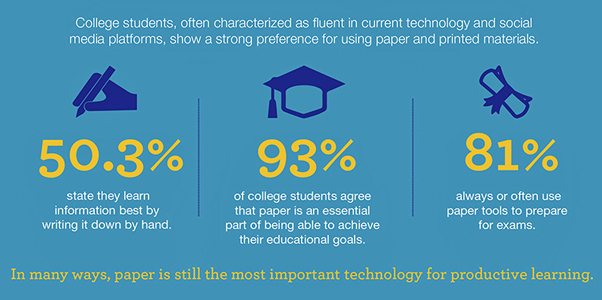Paper and Packaging Board Releases Third Annual Back-to-School Report
The
Paper and Packaging Board, McLean, Va., USA, has released its third annual
Back-to-School Report, which shows that students and parents still prefer paper. The report, based on extensive research and Nielsen data, highlights the role paper plays in education, and it proves that paper is still essential to learning.
According to the report:
- Nearly eight in 10 people think paper and packaging are relevant to their daily lives.
- The clear majority of students — 93% of college students and 87% of students grades 7-12 — think that paper is essential to their education.
- Parents agree, with 96% saying that paper is an essential part of children being able to achieve their educational goals.
The Paper and Packaging Board found that, among junior high and high school students:
- 70% prepare for tests by taking notes on paper.
- 58% fill out paper worksheets to study for tests and quizzes.
- 60% make and use flashcards.
The preference for paper doesn’t end with high school graduation. College students also report a distinct preference for paper:
- 81% always or often use paper tools to prepare for exams.
- 50.3% say they learn information best when writing it down by hand.

Reading Research: Does Paper Matter?
The Paper and Packaging Board’s Back-to-School Report also shares the many benefits of reading on paper, such as improved memory and recall, and increased language and mental development. Dr. Naomi Baron, professor of linguistics at American University in Washington, D.C., conducted reading research that shows how reading on paper versus a digital device helped people concentrate on the material, which improved how well they remembered it.
"The biggest challenge everyone faces when reading onscreen is distraction," Baron said. "Especially with an internet connection, the temptation looms to do something else — check a status update or post a new photo. Participants in my study were abundantly aware of the problem. A whopping 94% said the medium on which it was easiest to concentrate when reading was hard copy."
Baron’s reading research shows a clear correlation between recall and printed material.
"Students tell us they remember more when reading in print," she said. "Not surprisingly, some report spending more time when reading print, and reading more carefully than with digital texts."
What Do Millennials Think?
That doesn’t mean there isn’t a place for technology in students’ lives. The Paper and Packaging Board report cites a Nielsen study that found that millennials have a more positive view than any other generation on how technology is affecting their lives.
More than 74% of respondents think that new technology makes their lives easier. So it may come as a surprise that 95% of millennial parents believe that paper is an essential part of how children achieve educational goals. More than half of those surveyed feel most comfortable helping their children when they are working with textbooks, paper, and worksheets.
These technologically savvy, pro-digital millennial parents see something uniquely beneficial in using paper and print materials when it comes to their children’s education, and they prefer it in astonishingly high numbers.
TAPPI
http://www.tappi.org/

